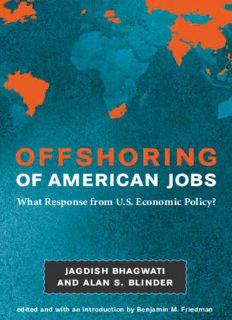
Offshoring of American Jobs: What Response from U.S. Economic Policy? (Alvin Hansen Symposium Series on Public Policy) PDF
Preview Offshoring of American Jobs: What Response from U.S. Economic Policy? (Alvin Hansen Symposium Series on Public Policy)
of f shor i ng of american jobs What Response from U.S. Economic Policy? jagdish bhagwati and alan s. blinder edited and with an introduction by Benjamin M. Friedman Offshoring of American Jobs Offshoring of American Jobs What Response from U.S. Economic Policy? Jagdish Bhagwati and Alan S. Blinder The Alvin Hansen Symposium on Public Policy Harvard University edited and with an introduction by Benjamin M. Friedman The MIT Press Cambridge, Massachusetts London, England © 2009 Massachusetts Institute of Technology All rights reserved. No part of this book may be reproduced in any form by any electronic or mechanical means (including photocopying, recording, or information storage and retrieval) without permission in writing from the publisher. For information about special quantity discounts, please email special_ [email protected] This book was set in Palatino by SNP Best-set Typesetter Ltd., Hong Kong. Printed and bound in the United States of America. Library of Congress Cataloging-in-Publication Data Alvin Hansen Symposium on Public Policy (2007 : Harvard University) Offshoring of American jobs : what response from U.S. economic policy?/ Jagdish Bhagwati and Alan S. Blinder ; the Alvin Hansen Symposium on Public Policy, Harvard University ; edited and with an introduction by Benjamin M. Friedman. p. cm. — (Alvin Hansen Symposium on Public Policy at Harvard University) Includes bibliographical references and index. ISBN 978-0-262-01332-1 (hbk. : alk. paper) 1. Offshore outsourcing— United States. 2. Labor market—United States. 3. Manpower policy— United States. 4. Free trade—United States. I. Bhagwati, Jagdish N., 1934– II. Blinder, Alan S. III. Friedman, Benjamin M. IV. Title. HD2368.U6A48 2009 331.12′042—dc22 2009005943 10 9 8 7 6 5 4 3 2 1 In memoriam Richard A. Musgrave Contents Introduction ix Benjamin M. Friedman 1 Don’t Cry for Free Trade 1 Jagdish Bhagwati 2 Offshoring: Big Deal, or Business as Usual? 19 Alan S. Blinder 3 Comments 61 Richard B. Freeman Douglas A. Irwin Lori G. Kletzer Robert Z. Lawrence 4 Responses 101 Jagdish Bhagwati Alan S. Blinder Contributors 123 Index 125 Introduction Benjamin M. Friedman Many Americans today have the sense that there is some- thing different, and not to the good, about this country’s economic relations with the rest of the world. Specifi cally, many people fear that their economic security—if they are working, their livelihood—is at risk. Much of this anxiety presumably refl ects familiar prob- lems that are now simply occurring in larger magnitude than previously. America’s trade imbalance, for example, has become both large and chronic. In 2007 U.S. imports overran U.S. exports by $713 billion, or more than 5 percent of the country’s entire economic output—a situation that both our own government and most international fi nancial institutions would quickly label dangerous, even irrespon- sible, if it occurred anywhere else. Another familiar part of the problem is the fi nancial fl ows that are the mirror image of this trade defi cit. The United States as a whole, including both the government and private fi rms, is borrowing from abroad and selling assets to foreign buyers far in excess of the pace at which this country is lending to foreigners and buying foreign assets. As the trade defi cit persists from year to year, these amounts borrowed, and the assets sold, accu- mulate. Today America is the world’s largest debtor country,
Description: